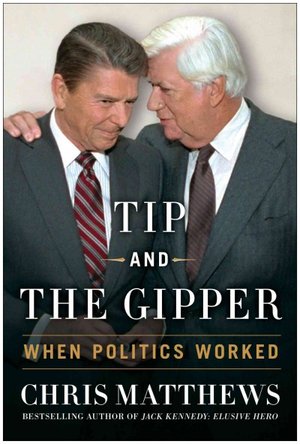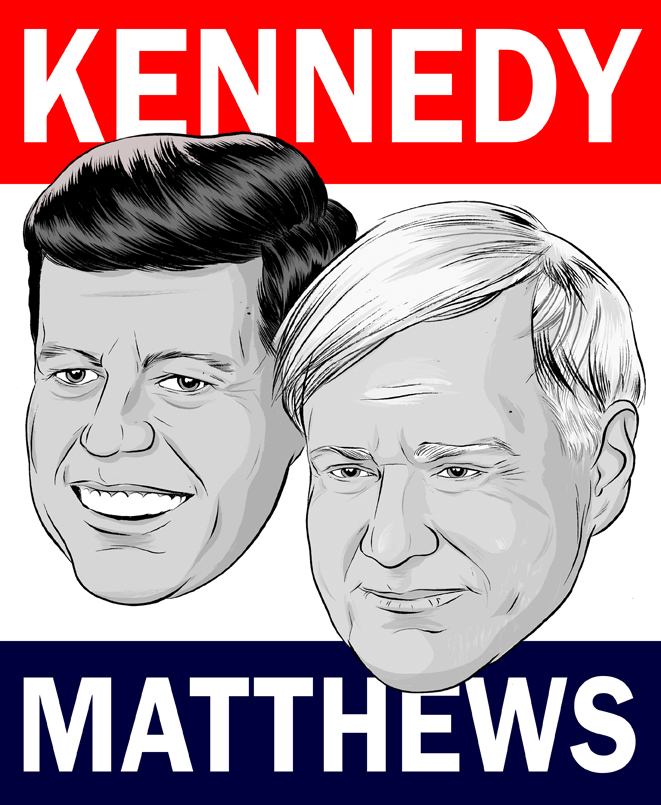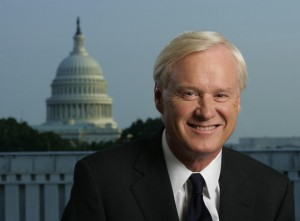Before Chris Matthews grilled politicians and their surrogates on his MSNBC show Hardball, he was a top aide to House Speaker Tip O’Neill, advising him on how to deal with the press. Now Matthews has written a new book drawing on those experiences, called Tip and the Gipper: When Politics Worked. It’s a look at how Speaker O’Neill and President Reagan managed to work together and reach compromise in spite of the fact that they disagreed not only on policy, but also on the role of government. Matthews compares that to the current era — a moment defined by “government by tantrum,” where “rather than true debate we get the daily threat of filibuster” and “shutdowns are engineered as standard procedure.” With the federal government shutdown serving as the backdrop, Matthews joins Fresh Air‘s Terry Gross to talk about his new book and his own “hardball” interviewing style. MORE
***
Talking JFK Blues With Hardballer Chris Matthews
Illustrations by ALEX FINE
EDITOR’S NOTE: This interview originally ran on March 29th 2012
 BY JONATHAN VALANIA We got the former Nor’easter and current Hardball host on the horn to discuss his recently-published Kennedy bio Jack Kennedy: Elusive Hero. Discussed: Joseph Kennedy’s Nazi apologia; the largely unheralded basic decency of Richard Nixon; why Chris Matthews’ mother was rooting for Joe McCarthy; why JFK banged everything that moved; who really killed Kennedy and why; how the Vietnam war would not have happened Kennedy had he lived to serve a second term; and why the myth of Camelot continues to make a chill run up the leg of the nation. Plus, who will win the presidency this fall.
BY JONATHAN VALANIA We got the former Nor’easter and current Hardball host on the horn to discuss his recently-published Kennedy bio Jack Kennedy: Elusive Hero. Discussed: Joseph Kennedy’s Nazi apologia; the largely unheralded basic decency of Richard Nixon; why Chris Matthews’ mother was rooting for Joe McCarthy; why JFK banged everything that moved; who really killed Kennedy and why; how the Vietnam war would not have happened Kennedy had he lived to serve a second term; and why the myth of Camelot continues to make a chill run up the leg of the nation. Plus, who will win the presidency this fall.
PHAWKER: Thank you very much for taking the time to come on the blog today. Let’s start with the father – Joseph Kennedy, a Nazi apologist?
CHRIS MATTHEWS: Yeah, I think so. I think the sad story there is that he never really saw the moral evil of a guy who was out to kill people or basically eradicate people that he didn’t like, whether they were Jews, 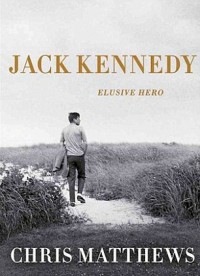 gypsies, gay people, or whatever the heck group he tended to have in mind. He liked Aryans, Germans, Nordics, Northern Europeans – everyone else was less than human, and I mean that. So Joe Kennedy was a bigoted guy who didn’t like Jews all that much and certainly had no problem with Hitler’s terrible policies towards them. It’s just a fact, and he basically sided with Chamberlain in terms of appeasing Hitler. He didn’t want to fight. He just really wasn’t a nationalist guy. He wasn’t really a patriotic American, regular American guy. He didn’t feel something for this country the way most people do and his kids did. His kids were real patriotic guys. I compare him to like The Godfather where the old Don in the movie just didn’t feel American, and the kids did.
gypsies, gay people, or whatever the heck group he tended to have in mind. He liked Aryans, Germans, Nordics, Northern Europeans – everyone else was less than human, and I mean that. So Joe Kennedy was a bigoted guy who didn’t like Jews all that much and certainly had no problem with Hitler’s terrible policies towards them. It’s just a fact, and he basically sided with Chamberlain in terms of appeasing Hitler. He didn’t want to fight. He just really wasn’t a nationalist guy. He wasn’t really a patriotic American, regular American guy. He didn’t feel something for this country the way most people do and his kids did. His kids were real patriotic guys. I compare him to like The Godfather where the old Don in the movie just didn’t feel American, and the kids did.
PHAWKER: Interesting. Do you agree with the generally accepted narrative now that the Chicago vote was in fact purchased by Joe Kennedy when Jack ran against Nixon in 1960?
CHRIS MATTHEWS: Well, I don’t know if it was purchased
PHAWKER: Okay, I’ll take that as a “No.”
CHRIS MATTHEWS: Well, what proof do you have?
PHAWKER: I don’t have any, beyond the fact that it has been repeated ad nauseum of just about every account of the election I have read. And since I’ve never seen it batted down, I can only assume it is true if such an incendiary claim is left to stand.
CHRIS MATTHEWS: Well, listen. The vote in Illinois didn’t decide the election. It didn’t decide the Electoral College, first of all, and secondly it wouldn’t have been decisive, Nixon still would have lost. Kennedy won the election – I mean, I know in my first book I wrote about Kennedy and Nixon, I wrote that dead people voted in Chicago. The machine put in some dead people, but there is a question about some of the wards and whether they were controlled by the mob, and when [Chicago Mayor Richard] Daley said to Kennedy that night of the election, ‘With the help of a few good friends, we’re going to win Illinois’ whether he’s talking about the mob who knows? But, I don’t think Illinois was decisive if you look at the numbers in the Electoral College. Money played a big part in the election, clearly, and the old man’s money was central. There was also apparently some mob money that filtered its way down to West Virginia, so it’s all part of the story, there’s no doubt about it. But it’s pretty murky. Pretty murky.
PHAWKER: In your telling, Nixon comes off as a more decent man than I would’ve expected.
CHRIS MATTHEWS: Yeah, well I tried not to get into certain conventional wisdom. I tried to tell the story from the evidence. You know, Nixon was the underdog. He wasn’t a good looking guy like Kennedy, he was a poor guy, he grew up pretty rough, he didn’t have the best of an upbringing, he went to school on scholarships, he got to Duke Law on scholarships, he had a scholarship to Harvard as a kid, but he didn’t even have the money to pay expenses. So he was sort of a hard-knocks guy, whereas Kennedy had pretty much the road ahead built for him. So I sort of looked at it from that point of view. I tried to tell the story, when I did bring up Nixon, and I also pointed out that Nixon and Kennedy were friends all the way up until they ran against each other, which always happens – you get mad at each other. But Kennedy called one of his closest friends, Charlie Bartlett – he’s still alive – that if he had lost the primaries to Humphrey and the other guys back in ’60 he was going to vote for Nixon, so that relationship was really not fractured until they ran against each other.
CHRIS MATTHEWS: Back in ’47, they went up to Pennsylvania on a train – that’s how they got around in those days – so they took the train back that night and they shared a sleeper car on the way back. They slept in the top and bunk and they talked all night about the Cold War. So they were friendly enough to do that.
PHAWKER: Moving on. Joe McCarthy was a Kennedy family friend and somehow JFK conveniently missed that Senate vote to censure McCarthy.
CHRIS MATTHEWS: Well what he was getting was his back operated on – he couldn’t walk anymore. He had to be in a wheelchair, and in the fall of ’54 he went into the hospital to get this life or death operation that nearly killed him. He had the last rites for the third time in his life. Nixon was crying that night because he thought that Kennedy was dead – the Secret Service agent told me that. The people of Massachusetts were hanging the black crepe, they thought they were going to name a successor, the governor up there was going to pick a new one soon because Kennedy was going to die. So, a really serious operation, but you’re right – it did come at the time of the vote on McCarthy. Jack Kennedy did not want to vote on it, but the sad thing is that Jack did not want to vote against McCarthy. McCarthy was enormously popular up in Massachusetts. I point out that even the guys up there, the Irish guys that were anti-Semitic and didn’t like Jewish people, they were all rootin’ for Roy Cohn, who was McCarthy’s guy against Bobby Kennedy because they were so red-hot for McCarthy. McCarthy was a lot bigger star in the country with the Irish back in ’54 than Kennedy was. Kennedy was sort of a freshman senator, but McCarthy was huge here. I grew up in North Philadelphia, Northeast Philadelphia – I moved up there and I remember coming home from grade school, I’d walk home and there Mom would be watching television, which was a rarity. We just got a TV set and she was watching the hearings. I know who she was rooting for – she was rooting for McCarthy. So among the Irish people back in those days, McCarthy was a real hero because he was taking on the Communists, and we all hated the Communists.
PHAWKER: Early in JFK’s Senate career he tacked to the right to the dismay of liberals and then leftward in advance of the presidential…
CHRIS MATTHEWS: Yeah, it’s fair to say he moved to the left to help him get his chance at running for president in the late ‘50s, sure.
PHAWKER: Well, you know, which is not unusual for a…
CHRIS MATTHEWS: Yeah, you’re right. They all do it.
PHAWKER: But does triple AAA political expediency for a moment, where do you think Jack Kennedy’s ideological compass pointed?
CHRIS MATTHEWS: Well, I think he was dynamite – for any white guy – he was dynamite on Civil Rights, he had the nerve to come out in ’60 and call Mrs. King. He got involved with Dr. King after Bobby got him out of 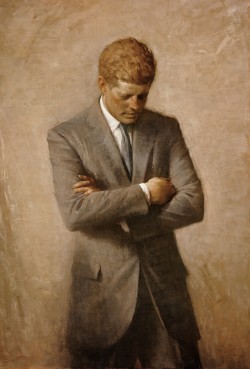 prison, actually, in that ridiculous episode where they threw him in jail for having the wrong driver’s license, basically. His support for the Civil Rights thing puts him right out at the progressive liberal end of things. In the fall of ’62 he gets federal troops to basically take down Ross Barnett and integrate the University of Mississippi against the governor and the white people and everybody – he had to take them on with federal troops. He did the same thing in June of ’63 against Wallace in Alabama when he integrated the University of Alabama. He had to bring Vivian Malone and the others. Vivian’s sister Cheryl Malone is married to Eric Holder. It’s amazing how history changed, but the system or the current attorney general was the young women – a girl at the time – who got integrated into the University of Alabama in ’63 by Kennedy. So he and Bobby were really good on that, on tax cutting – as far as to say they were tax cutters – he was anti-Communist, he had the space program, he had the Peace Corps, special forces…you know, it’s really hard to say if he was left or right. Kennedy, I would say, would be center-left by today’s definition. Or even center. But on issues like being patriotic and anti-Communist, you know, I think he was known most for peace. He arranged the first peace treaty with the Soviet Union on nuclear testing, and ended up cutting a secret deal to get us out of the Cuban Missile Crisis, I’d call him a practical, good guy, centrist. Somewhere in the middle.
prison, actually, in that ridiculous episode where they threw him in jail for having the wrong driver’s license, basically. His support for the Civil Rights thing puts him right out at the progressive liberal end of things. In the fall of ’62 he gets federal troops to basically take down Ross Barnett and integrate the University of Mississippi against the governor and the white people and everybody – he had to take them on with federal troops. He did the same thing in June of ’63 against Wallace in Alabama when he integrated the University of Alabama. He had to bring Vivian Malone and the others. Vivian’s sister Cheryl Malone is married to Eric Holder. It’s amazing how history changed, but the system or the current attorney general was the young women – a girl at the time – who got integrated into the University of Alabama in ’63 by Kennedy. So he and Bobby were really good on that, on tax cutting – as far as to say they were tax cutters – he was anti-Communist, he had the space program, he had the Peace Corps, special forces…you know, it’s really hard to say if he was left or right. Kennedy, I would say, would be center-left by today’s definition. Or even center. But on issues like being patriotic and anti-Communist, you know, I think he was known most for peace. He arranged the first peace treaty with the Soviet Union on nuclear testing, and ended up cutting a secret deal to get us out of the Cuban Missile Crisis, I’d call him a practical, good guy, centrist. Somewhere in the middle.
PHAWKER: Okay. It’s not clear to me through the book why Kennedy wanted to pull out of the Bay of Pigs invasion before it went down.
CHRIS MATTHEWS: Well, think about it – he didn’t ask the right questions of the military. The military didn’t give him the information and they screwed up, basically. He went in there with fifteen other Cuban exiles. A lot of middle class guys or high-rank caches. They weren’t soldiers, they weren’t street guys, they weren’t tough guys. So they go in there against 25,000 regular Cuban army troops the first day. All Kennedy had to ask was, order of battle. How many people we’ve got to face the first day we go in there. The first day – 25,000 people, to be outnumbered that badly. He had the intel, he had people around the world looking out for him like the head of the CIA Allen Dulles, was really an Eisenhower guy. Yeah, they weren’t loyal to him. They basically took him into a box canyon, they got him on the ground there, then he would have to support bringing in the troops. He was bringing in the Air Force and everything, and basically going to war with Castro. And Kennedy said there’s too many Russian soldiers there, I’m not going to go to war with Russia and Cuba, and you’re not going to trick me into this so I’m pulling out. So basically blew the whistle on the whole Cuban Missile thing he took the hit for it, and he took the blame publicly. He said I’m not going to get tricked or get pushed around by the military or the CIA. So he saw that they couldn’t win with the Cuban exiles, and he wasn’t going to take the American military into that country.
PHAWKER: Do you believe that, as the narratives say of Oliver Stone’s JFK, that Kennedy was on a path towards de-escalating Vietnam and…
CHRIS MATTHEWS: Well, I don’t believe a word that Oliver Stone ever said. I think he’s a complete fiction writer with those movies. He’s a great movie-maker, I love his movies. But it’s movies. Wall Street movies like that, Born On The Fourth Of July, Platoon was a hell of a movie. The film is dynamite, but I don’t believe his history. I just think he makes it up. I do believe, though, your point. I do believe that Kennedy would not have done what Johnson did – put a half million troops there, because he saw what the French did. In fact, right up until the end, Kennedy was making sure that no U.S. combat officer would take into combat. In fact, one guy was going to do it and he said, you do that and I’m basically going to punish your whole unit. So you’re not going to that, I’m going to strip your whole unit. So he was tough about keeping us out of combat, but nobody – and Oliver Stone certainly doesn’t know- knows what would’ve happened in 1965, when it was pretty clear that the South Vietnamese government was going to fall to the Communists. What would Kennedy have done if he had been elected or survived his second term at that critical moment when he had a choice between losing Vietnam or putting troops there? We don’t know. We do know that he found a neutral solution for taking over the coalition government in Laos, we do know that he was trying to find a way out of Vietnam. We know that, but we don’t know what he would have done when it really hit the fan and he had to decide whether he was going to take the loss or not. We just don’t know.
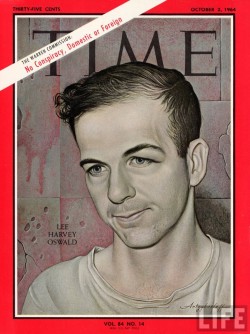 PHAWKER: You don’t really address this, his assassination doesn’t really figure into the book much, but I wondered what your personal feelings were as to what exactly happened that day? Was the Warren Commission report what happened, or was there a conspiracy?
PHAWKER: You don’t really address this, his assassination doesn’t really figure into the book much, but I wondered what your personal feelings were as to what exactly happened that day? Was the Warren Commission report what happened, or was there a conspiracy?
CHRIS MATTHEWS: Well, we never know. We know the facts. We never know what we don’t know, so you can have all kinds of secrets. I always say to people that fifty years of conspiracy theories had better come up with some evidence, and you don’t have evidence. I think that Lee Harvey Oswald was a disillusioned Communist. He had gone to the Soviet Union and came back, didn’t like the Soviet Union and became infatuated with Castro. Had gone just a few days before to the Cuban and Soviet embassies in Mexico City. Had some hope of getting an escape route with the help of the Communists, and tried to kill Edwin Walker, tried to kill Nixon. The guy definitely was a man of the far left, a Communist sympathizer. We just don’t know. My sense is – and I always ask this question – how do they know…let me phrase it this way: He had a job at the book depositary on the motorcade route long before the motorcade route was established that day. So, he had the opportunity and he developed the opportunity and used it. He got the gun by mail order and everything, so he was operating on his own, I think. I always say to people, “How did he get this job way before he had the motorcade route? How did he know he’d have a shot out the window of the place that he worked even before they had the motorcade route, the parade routes that the president took that day?” So I think it was a crime of opportunity – that’s my belief and all of the recent studies, the biggest work on it by [Vincent] Bugliosi and all of the other guys should write about this dead serious if he was operating alone. That’s the best information we have. I don’t challenge anybody who has conspiracy theories, but they’re really theories at this point if we have evidence.
PHAWKER: Fair enough. Just a few more questions here and I’ll let you go. How different would have history played out if JFK lived to serve a second term, do you think?
CHRIS MATTHEWS: Well, I think he was an unhealthy guy, physically. I think he was always sort of covering up the Addison’s disease, and he was always taking a lot of steroids for years. I mean, look at the athletes that take them. Years and years of all that steroid intake – and I had steroids for a few days for pneumonia once and I loved them. They’re great. They make you feel great. They give you a real sense of well-being and you don’t want to quit them, but you have to because they’re not healthy for you as everybody knows who follows sports. But he was taking them for years and they were really hurting his bone tissue, his back was getting worse because his bones were degenerating over time. Historian Robert Dallek has done a lot of work on this. He was just getting worse and he was always walking with crutches, they had to use a cherry picker to get him up on Air Force One sometimes. His Addison’s disease was under control, I guess, because of the steroids but he had colitis. You know, you’re a very unhealthy guy, and it’s hard to tell when you look at the pictures of him during the Civil Rights fights. You know, if you watch him sitting in his chair and walking around he’s not the healthiest looking guy, but he always had the tan, he always looked ruddy, he was always out in the weather and he looked healthy. So I’m not sure how healthy he would’ve been for four more years, to be honest. That’s what I don’t know about it. I think he would have been a successful second term president, I think he was a good politician and he got better all the time. He was always honest – he had that sense of responsibility when things went wrong, unlike guys today. He would say like, “Okay, the Bay of Pigs was my fault” and the public liked him for that. During the war he had really proven himself by saving his men. His boat got cut in half, and he was swimming around for four hours saving all but ten of the guys. I think people were rooting for him, to be honest. I think he would have made it.
PHAWKER: Do you think the ‘60s would have been less turbulent if JFK had served that second term?
CHRIS MATTHEWS: Oh, yeah, I think so. I think so much of my life growing up…I mean, everything was bad after Kennedy got killed. There was a real bleak feeling in the ‘60s, like things were just bad. People felt bad. The country got a real angry mood under Johnson, and Johnson took us into the war with a half million troops. Poor people had to fight the war – there were so many exemptions and deferments that poor people and the blacks, everybody had to go fight that war. They were very angry about it, and they didn’t come back to anybody treating them well, either. So it was a very, very deeply unpopular war with a half million guys at a time over there. Many of the guys went through it one time or another, all the guys coming home injured and shot up and just had bad feelings about the whole war. And then Watergate came around and history would have been so different if Kennedy had stuck around and maybe Bobby would have been elected president, all kinds of things. You know, the assassinations – I hate to say it, but they worked. If you hate America, assassinate the presidents, because it worked. The assassins win. The horror of assassination is that it takes away our leaders, and we don’t have that many good leaders. I mean, we just don’t. When you lose the good ones, you’re left with the dregs. You’re stuck with what’s left. With the guys that lost the elections, like Nixon. They get to be president. Johnson. When you lose your best, you’ve got a real problem. It’s like a sports game. In history, if the best players get beaten up then you have the second-rate teams and you lose. It’s just like that, I think.
PHAWKER: What do you make about this new intern story that surfaced?
CHRIS MATTHEWS: Oh, I know [Mimi Alford], I met her years ago at a political campaign. She was beautiful and delightful, and any guy would say she was appealing. I met her when she was about thirty, and you know, I can’t defend it – if it happened in the workplace, any guy would get in trouble. It was a misuse of power of a president over a young woman who was dazzled by him, and it was an exploitation of somebody who was young and attractive. You know, he was a married man, he was president of the United States, and he had responsibilities. In those days you could kind of get away with that type of behavior and today you couldn’t. You know, we all know the rules. It’s no shocker – we know the rules. We wrote them!
PHAWKER: But how do you explain JFK’s womanizing to yourself? Why did he so aggressively pursue all these extramarital affairs?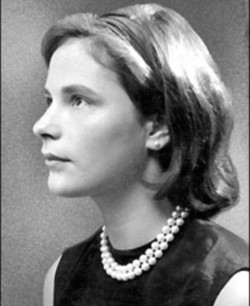
CHRIS MATTHEWS: I think some of the top were sure that he was a rock star – he was incredibly handsome and incredibly confident. With women he knew that all women loved him. I’ve heard stories, Jonathan, which would just blow your mind about women meeting him and just melting in his presence. Just giving themselves to him. It’s an astounding story of I guess…women can’t explain it. Men have a hard time figuring it out because very few men – well, I don’t know any men who have this kind of appeal to women. I read stories that were almost just like Superman, where he would come into a room and women would just stare at him and they would just want him. It’s so hard to explain, it’s like a romance novel where it’s just like a star-struck…and guy’s reactions to him was a different kind of charisma. They would react to him like, “I will follow this guy into combat. If he says go, I’m going.” They loved him in their own way – in a manly way. They looked up to him as a hero. I guess it’s the word charisma in the room. I’ve heard stories about his power to affect women that are just stunning. That’s all I can tell you. All I can tell you, Jonathan, is that I’ve never met anyone like him. When I describe it, it almost sounds a bit like hero worship because it’s just strangely magnificent, I guess, his appeal to people. I guess you’d fall under the spell of him, and he took advantage of it. That’s all I can say.
PHAWKER: Was he as great as the left makes him out to be, or was he…
CHRIS MATTHEWS: Well, I don’t think that it’s the left. I think it’s people that like heroes. All I know is this: In a poll about a year and a half ago that CBS did, they asked people, “Who should be on Mt. Rushmore?” That’s a great question. Who should be one of our heroes? Kennedy beat Reagan, he beat Roosevelt, he beat everybody. People think of him as a hero. I mean, I’ll just tell you, it’s a heroic – I mean, there’s a reason why African American families, I think some of the older people, they still have the picture of Dr. King and the Kennedy brothers. I think, because he stood out at a time that nobody else did on Civil Rights. When we were losing the Cold War to the Soviets he put the men, Senate toward the moon. He created the Peace Corps. He gave us this feeling like we could win again, and the country felt like it was a winning country under Kennedy. Maybe you had to be there, but he united us. He said, “Ask not what your country can do for you, but what can you do for your country.” He really taught people the duty, and about feeling great as Americans. He really did start the thing that we got to with Civil Rights, and you know? Watch the NCAA football championship that year, you should watch the LSU fight with Alabama, those five [black] players wouldn’t be on the field! He had to do that at gunpoint! He had to bring federal troops in to make that happen, and that’s history! He did it, but all this womanizing and all this other stuff, he did that, too.
PHAWKER: What is his place in history? How will he rank as time goes on, and how will his presidency rate in history compared to other presidents?
CHRIS MATTHEWS: Well, if I have anything to do about it, pretty high. (laughs) Okay? I think he was a hero. I think he was a hero like Henry V of England. I think he’s one of those leaders that comes down the track every once in a while that people want to follow, and they believe that he’s the best of their country. When you get into a crunch, he’s the one that’s going to get you out of the crunch, and he’s going to make the right decisions to save us. At the time in 1962 when all of the other crazy people wanted to bomb Cuba, which would have brought about a nuclear war between us and the Soviet Union, and Khrushchev was ready to fire the last missiles at New York and then we would have fired everything we had at him. A hundred million people would have been dead, and everything around us today would be showing the scars of that nuclear war if there was anybody left alive. Kennedy said no. He and his brother Bobby were the ones that said no to all of the guys around – the generals, the experts, and he said no. If he hadn’t have been there, we would be in hell right now in terms of this planet. So, I really believe he did that, and that’s why he’s my hero.
PHAWKER: Two quick questions about current events and then we’ll say goodbye. You’ve been in politics for a long time, you’ve been around the block a long time – has there ever been a time where government seemed to be as bought and sold by special interests as they are today?
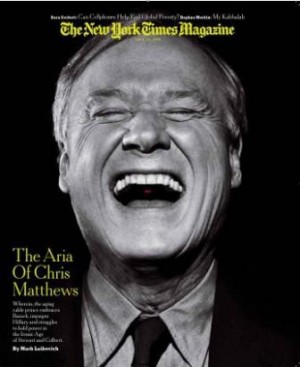 CHRIS MATTHEWS: I know that I’ve never seen as much money being splashed around in politics, and we’re talking about a billion dollars on the president’s side. A billion dollars against him. These people that give money want something, and these big PACs, these political action committees throwing money around in Washington here. They’re putting up the buildings on K Street and on G Street, all around the White House. Those buildings are all filled with lawyers and public relations firms, lobbying firms and trade associations, and every single one of those people in every single one of those buildings are working for special interests. That’s what’s going on, and when you walk into Congress you have to stand up against those kinds of people, and it’s tough. A former senator told me that at nighttime when they’re voting on the Senate floor, and you have like fifteen minutes between the vote, the senators go out to their cars in the parking lot in front of the Capitol and they make phone calls to raise money between votes.
CHRIS MATTHEWS: I know that I’ve never seen as much money being splashed around in politics, and we’re talking about a billion dollars on the president’s side. A billion dollars against him. These people that give money want something, and these big PACs, these political action committees throwing money around in Washington here. They’re putting up the buildings on K Street and on G Street, all around the White House. Those buildings are all filled with lawyers and public relations firms, lobbying firms and trade associations, and every single one of those people in every single one of those buildings are working for special interests. That’s what’s going on, and when you walk into Congress you have to stand up against those kinds of people, and it’s tough. A former senator told me that at nighttime when they’re voting on the Senate floor, and you have like fifteen minutes between the vote, the senators go out to their cars in the parking lot in front of the Capitol and they make phone calls to raise money between votes.
PHAWKER: Oh, man. Yeah. Well, they have to start raising money almost the moment after they’re sworn in.
CHRIS MATTHEWS: Yeah, I was thinking about getting into politics and I don’t want to sit on the phone all day and kiss butt. You know?
PHAWKER: Yeah, I wanted to ask you about that because you did make noise about that.
CHRIS MATTHEWS: Well, I didn’t want to do it. I don’t want to put up with that. Who wants to put up with constant attacks on you? It takes a certain type of person to want to go into the public life today with constant attacks on everything about your personal life, with everything about you. How you walk, how you talk, and you know? Everything you’ve done wrong in your life, because everybody’s done something wrong. Just having to constantly put up with it – it takes a Bill Clinton or a Barack Obama to just take it. It takes an unusual crust on your skin to have somebody just keep pounding you – and Bill Clinton kept taking it. He laughs it off, pretty much. I mean, just look at him. He’s pretty popular today, and he went through everything. He made mistakes and he did things wrong, but he didn’t let it kill him. That takes real guts, I think.
PHAWKER: Last question. Who’s going to be running against Barack Obama in the fall?
CHRIS MATTHEWS: I have no special answer, except it looks like in the end, they’re going to end up with Romney and they’re not going to like him. They’re going to try to find a running mate to run with him that makes him exciting to the right, and it depends on whether or not that candidate can win. Depending on the economy. I mean, right now I think the president will win because he’s really got his act together and he’s looking good out there, and Mrs. Obama is out there campaigning, and I think he’s doing the right things now. The economy’s getting a little better – not great, but a little better. If it doesn’t fall down again, I think he can win. I do think that it’s always a question of the unemployment rate. We get an unemployment rate right before we vote, around October this fall. If that unemployment rate is down around eight percent, I think Obama wins. If it gets up to around 9 percent, I think that he could lose. It’s going to be a real close election, I think.
PHAWKER: Last question. What common ground do Obama and John F. Kennedy share? Is it just the charisma, is it beyond that?
CHRIS MATTHEWS: I think it’s basically just charisma, but there’s a lot to that. I think they’re both incredibly strong speakers. They can speak to America. I mean, I’ve been made fun of for saying that he thrilled me, but he spoke about America – this guy with this African name, Barack Hussein Obama, with the Islamic middle name and all. The fact that he got elected here, and only in this country is that story possible. I think in the end, the American people vote in their self-interest. They vote for the guy who looks like he’s got the hot hand – he can get the ball in the basket, if you will. Who can score the touchdown, the guy who can do it. In the end, we vote for the guy that can do the job, and he looked like – forget about ethnicity and race, he could look like he could do the job better than McCain could do it. In the end, we give the ball to the guy who can hit the basket, and I hope this election is like that but in the end we make the decision this fall. Who can score for us and win for us in a tough time? Kennedy was that guy in ’60. He got the country moving again, despite his religion. I think this time, despite his background – which is very exotic by most of our standards with an African father and Aryan mother, grandparents from Kansas. You know, it’s an interesting background but people said, you know, he’s got a better shot at doing a better dob than McCain, so we’re going to give him a chance. So, I like to believe in America and I like to believe that we’re pragmatic and that we pick the best guy, and it still looks like he can do it now. So, he and Kennedy both look like winners.
PHAWKER: That looks like a good place to end. Chris, thanks for your time.
CHRIS MATTHEWS: Hey, thanks for your time, Jonathan.

